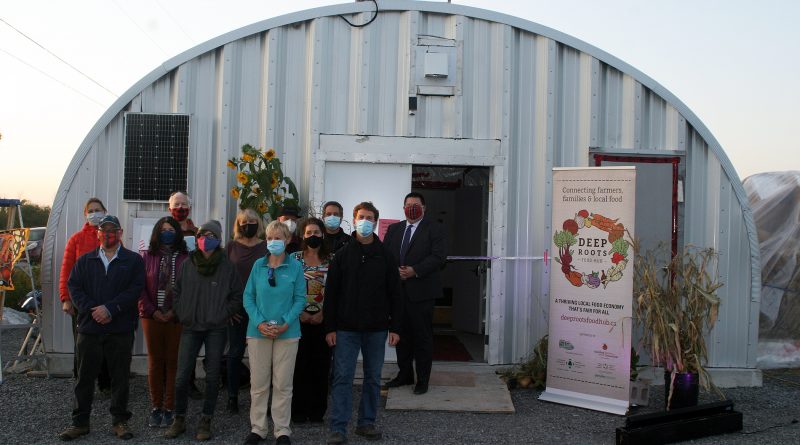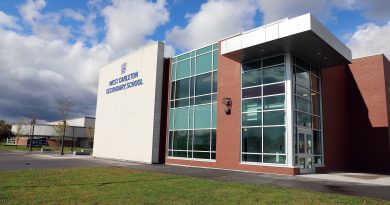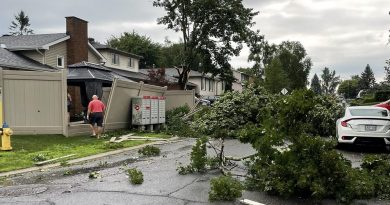Deep Roots AGM focuses on food system
By Jake Davies - West Carleton Online
WEST CARLETON – A small organization, the Deep Roots Food Hub (DRFH) has a lofty goal, revolutionizing the world’s food system in to something efficient and sustainable.
“We produce five earths’ worth of food and 800 million people are starving,” DRFH chair Dr. Barry Bruce said to the roughly 11 attending via Zoom teleconferencing over the Internet. “We have no choice but to come up with a new system.”
But the DRFH is a very small, volunteer organization. Almost all of its resources are put in to operating and maintaining the off-grid root cellar the organization fundraised for, built and officially opened in fall of 2020.
The root cellar, started in idea form in 2015, as a place for West Carleton farmers to safely store harvested food. The National Capital Commission donated land in Bay Ward on Davidson’s Side Road for the project, the City of Ottawa donated $25,000 and the Ottawa Community Foundation also provided financial support.
In 2019, the cellar was built, and last winter the team tested its ability to safely store food. It has the capacity to store up to 60,000 pounds (27,000 kg) of food in the 25-foot by 25-foot (600 square feet) storage space. The cellar is state of the art and off the grid.
The facility provides small-scale vegetable growers with a postseason sustainable and energy-efficient storage facility providing longer root crop storage and extended sales and/or distribution possibilities.
The DRFH has been working to fill the cellar ever since.
Even when hosting an AGM, cost is considered.
That’s why the DRFH chose to host its Dec. 5 AGM online. No rooms needed to be rented. No travel required. No extra spending.
There were some positives and some negatives in the organization’s last calendar year.
The DRFH was able to upgrade the power system at the root cellar in December 2021 and now has a bank of lithium batteries and solar cells, using a grant from the city’s Rural Affairs funding program.
It was not a great year for the DRFH’s partner ExerFarm which grows produce at the site.
ExerFarm scaled up from farming 2,000 square feet of land to 45,000 sq-ft “but due to extreme weather conditions and poor germination, produced less than 1,000 pounds of root vegetables for the root cellar as well as flint corn and squash.
“Going forward there is a desire to enrich the soil to be more resilient to the changing climate using regenerative agriculture techniques,” Bruce said. “Judith Lockwood, a member of the DRFH research team, is taking an extensive course in regenerative agriculture via Dr. Elaine Ingham’s Soil Food Web School.”
In total, the root cellar is storing about 6,000 lbs of root vegetables, similar to the 2021-2022 winter season, and about 10 per cent of its capacity.
New board member Krystal Kehoe MacLeod spoke of a new project the DRFH is undertaking this coming year.
Currently the hub is recruiting 30 families in the Carp area to create 30 backyard gardens “to grow and consume their own food and produce surplus to share with others in need in the community,” MacLeod said.
The Community Garden Pilot Project is led by a three-person committee and began recruiting garden leaders last October. Currently three are enrolled and more recruitment will be done in the new year with the help of the West Carleton Family Health Team.
Root vegetable seeds will be purchased wholesale. The committee will prepare a calendar of “key garden timelines” and dates for educational activities and will debrief after the growing season to gauge the success of the project and potential growth in the future.
Financially the DRFH is in good shape, but working to rebound from the COVID years.
The DRFH’s total liabilities and net assets dropped from $14,378 in 2020 to $8,334 in 2021. Grant funding was way down in 2021 at $4,237. A significant drop from the $15,000 the DRFH received in 2020. The DRFH’s total income in 2021 was $6,205.30.
Expenses, highlighted by a $4,141 strategic retreat and the $4,237 that went in to the cellar’s power upgrade, the DRFH spent $12,249.22 in 2021 for a loss of $6,043.92.
The DRFH has a total net asset value of $8,033.67. Only about $300 of those funds are unrestricted. The rest have specific spending requirements. The DRFH’s cash flow sits at $4,097.












